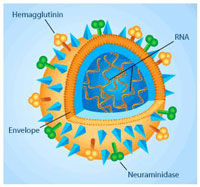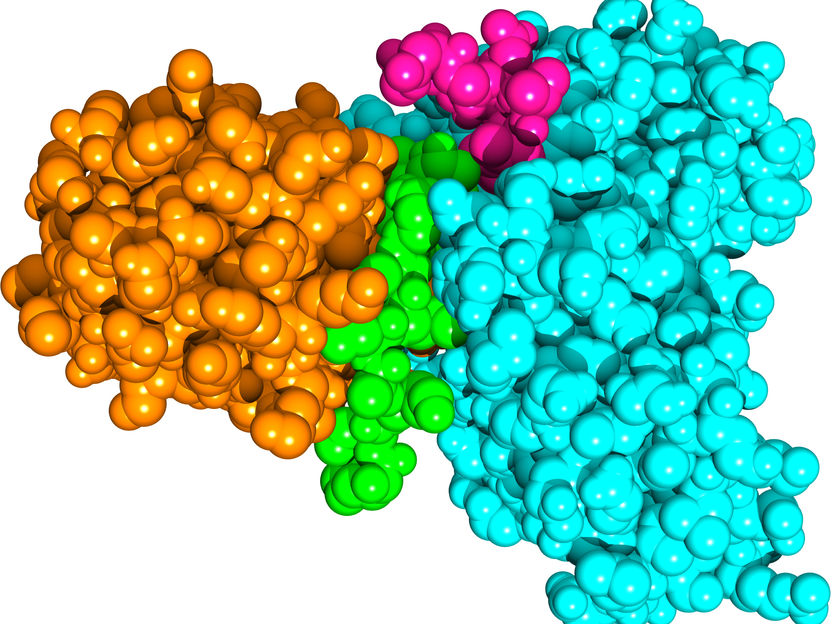Scripps Research Scientists Successfully Test New Anti-Obesity Vaccine
Prototype Slows Weight Gain, Reduces Fat in Animal Models
In what may be the first published breakthrough of its kind in the global battle against obesity, scientists at The Scripps Research Institute have developed an anti-obesity vaccine that significantly slowed weight gain and reduced body fat in animal models. The study is being published in an advanced, online edition of the Proceedings of the National Academy of Sciences.
In the new study, mature male rats immunized with specific types of the active vaccine ate normally yet gained less weight and had less body fat, indicating that the vaccine directly affects the body's metabolism and energy use. This finding may be especially important to stop what is commonly known as "yo-yo dieting," the cycle of repeated loss and regain of weight experienced by many dieters. The new vaccine, which is directed against the hormone ghrelin (pronounced "grell-in"), a naturally occurring hormone that helps regulate energy balance in the body, has shown the potential, in animal models at least, to put an end to that risky and often futile struggle.
These findings may mark a turning point in the treatment of obesity by confirming the effectiveness of immunopharmacotherapy to combat this serious and growing global problem. Immunopharmacotherapy engages the immune system, specifically antibodies, to bind to selected targets, directing the body's own immune response against them. This approach is being tested in a number of other areas including drug addiction, especially addiction to cocaine and nicotine.
"The study shows our vaccine slows weight gain and decreases stored fat in rats," said a senior author of the paper Kim Janda, Ph.D., who is Ely R. Callaway, Jr. Professor of Chemistry at Scripps Research, a member of The Skaggs Institute for Chemical Biology, and director of the Worm Institute of Research and Medicine. "While food intake was unchanged in all testing groups, those who were given the most effective vaccines gained the least amount of weight. To have an impact on appetite and weight gain, ghrelin first has to move from the bloodstream into the brain-where, over long periods, it stimulates the retention of a level of stored energy as fat. Our study is the first published evidence proving that preventing ghrelin from reaching the central nervous system can produce a desired reduction in weight gain."
Ghrelin, a gastric endocrine hormone produced primarily in the stomach, plays a physiological role in energy homeostasis, although the full extent of that role remains unknown. It was first identified in 1999 as a naturally occurring ligand-a molecule that binds to another to form a larger molecular complex-for a growth hormone secretagogue receptor. What is known is that ghrelin promotes weight gain and fat storage through its metabolic actions, decreasing the breakdown of stored fat for energy as well as curbing energy expenditure itself. During periods of weight loss, such as dieting, the body produces high levels of ghrelin to slow down fat metabolism, encourage eating, and promote fat retention, changes which normally make it difficult to lose weight and keep it off.
The researchers developed three active vaccines (labeled Ghr1-2-3) to immunize adult male rats. Those animals immunized with Ghr1 or Ghr3 showed greater and more selective plasma-binding capacity for the active form of ghrelin-keeping the hormone in the blood and away from the brain and the central nervous system-as compared to Ghr2 or control models.
During the study, the rats immunized with Ghr1 and Ghr3 ate normally but, once antibody levels increased, accrued less body weight and fat, indicating an increase in the body's use of energy, a finding supported by studies of genetically altered mice. For example, the authors of the study write, "mice deficient for ghrelin or its receptor store less of their consumed food and resist accumulating body weight and fat on energy dense diets. [Ghrelin-deficient mice] also expend more energy and [are more active], [while] ghrelin receptor deficient mice show increased [utilization of fat as a key energy source]."
The study did note, however, that the immunized rats were fed low-energy, low-fat, and relatively less palatable chow diets and were comparatively lean. "Whether active immunization against ghrelin would help prevent the development of obesity caused by... high-fat 'Western' diets or would facilitate weight loss once obesity is established" remains uncertain, the study added.
Other news from the department science
Most read news
More news from our other portals
See the theme worlds for related content
Topic world Antibodies
Antibodies are specialized molecules of our immune system that can specifically recognize and neutralize pathogens or foreign substances. Antibody research in biotech and pharma has recognized this natural defense potential and is working intensively to make it therapeutically useful. From monoclonal antibodies used against cancer or autoimmune diseases to antibody-drug conjugates that specifically transport drugs to disease cells - the possibilities are enormous

Topic world Antibodies
Antibodies are specialized molecules of our immune system that can specifically recognize and neutralize pathogens or foreign substances. Antibody research in biotech and pharma has recognized this natural defense potential and is working intensively to make it therapeutically useful. From monoclonal antibodies used against cancer or autoimmune diseases to antibody-drug conjugates that specifically transport drugs to disease cells - the possibilities are enormous

























































